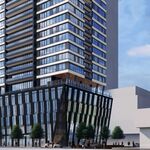M II A II R II K
Senior Member
The plight of Canadian cities
January/February 2011
By John Macfarlane

Read More: http://www.walrusmagazine.com/articles/2011.01-editors-note-editors-note
In 1867, when the British North America Act set out the terms of Confederation, most Canadians lived in small towns and villages or on farms. Cities as we now know them did not exist yet. The population of Montreal, then the country’s biggest city, was 105,000. Quebec City, at 60,000, was next, followed by Toronto, which had 50,000 inhabitants. Only one in five Canadians lived in a community with more than 1,000 residents, so the fact that the act made no provision for the financing of cities was unsurprising. Unsurprising, but unfortunate, because here we are, almost a century and a half later, an overwhelmingly urban society struggling to pay for pothole repairs and garbage removal because the Fathers of Confederation gave taxation rights exclusively to the federal and provincial governments. Then, as now, cities were an afterthought.
- Fall municipal elections in Alberta, Saskatchewan, Ontario, and Prince Edward Island produced unwelcome reminders of the plight of our decaying, underfunded cities. One has only to watch television news to see how quickly we are falling behind urban behemoths that, until recently, we had never heard of. In fifteen years, China will have fifteen urban centres with populations averaging twenty-five million. In Canada, the only city with global potential — by virtue of its size, wealth, and diversity — is Toronto, but Toronto is falling apart. Its public transit system, once the envy of North America, is now twenty-five years behind the times. Its streets and parks are an embarrassment.
- The problem originates with the Constitution but is sustained by politics. The country’s electoral map has not been redrawn to adequately reflect this new urban reality. In the House of Commons, politicians representing rural ridings still hold a disproportionately large number of seats (138 of 308). This distortion of representation by population persists at the provincial level as well, compounding the problem. At the senior levels of government, then, there is little or no immediate advantage in addressing the welfare of cities, although, to be fair, some politicians have tried.
- David Miller, the outgoing mayor of Toronto, was fond of reminding the electorate that only six cents of every Canadian tax dollar is spent on cities. Perhaps he hoped that knowledge of this fiscal injustice would encourage us to take to the streets in protest. If so, he was disappointed, because in Toronto, as in Canada’s other big cities, the citizenry still seems to believe that city building is a municipal enterprise, when, as more enlightened nations are beginning to realize, it is also the job of the state.
.....

January/February 2011
By John Macfarlane

Read More: http://www.walrusmagazine.com/articles/2011.01-editors-note-editors-note
In 1867, when the British North America Act set out the terms of Confederation, most Canadians lived in small towns and villages or on farms. Cities as we now know them did not exist yet. The population of Montreal, then the country’s biggest city, was 105,000. Quebec City, at 60,000, was next, followed by Toronto, which had 50,000 inhabitants. Only one in five Canadians lived in a community with more than 1,000 residents, so the fact that the act made no provision for the financing of cities was unsurprising. Unsurprising, but unfortunate, because here we are, almost a century and a half later, an overwhelmingly urban society struggling to pay for pothole repairs and garbage removal because the Fathers of Confederation gave taxation rights exclusively to the federal and provincial governments. Then, as now, cities were an afterthought.
- Fall municipal elections in Alberta, Saskatchewan, Ontario, and Prince Edward Island produced unwelcome reminders of the plight of our decaying, underfunded cities. One has only to watch television news to see how quickly we are falling behind urban behemoths that, until recently, we had never heard of. In fifteen years, China will have fifteen urban centres with populations averaging twenty-five million. In Canada, the only city with global potential — by virtue of its size, wealth, and diversity — is Toronto, but Toronto is falling apart. Its public transit system, once the envy of North America, is now twenty-five years behind the times. Its streets and parks are an embarrassment.
- The problem originates with the Constitution but is sustained by politics. The country’s electoral map has not been redrawn to adequately reflect this new urban reality. In the House of Commons, politicians representing rural ridings still hold a disproportionately large number of seats (138 of 308). This distortion of representation by population persists at the provincial level as well, compounding the problem. At the senior levels of government, then, there is little or no immediate advantage in addressing the welfare of cities, although, to be fair, some politicians have tried.
- David Miller, the outgoing mayor of Toronto, was fond of reminding the electorate that only six cents of every Canadian tax dollar is spent on cities. Perhaps he hoped that knowledge of this fiscal injustice would encourage us to take to the streets in protest. If so, he was disappointed, because in Toronto, as in Canada’s other big cities, the citizenry still seems to believe that city building is a municipal enterprise, when, as more enlightened nations are beginning to realize, it is also the job of the state.
.....





